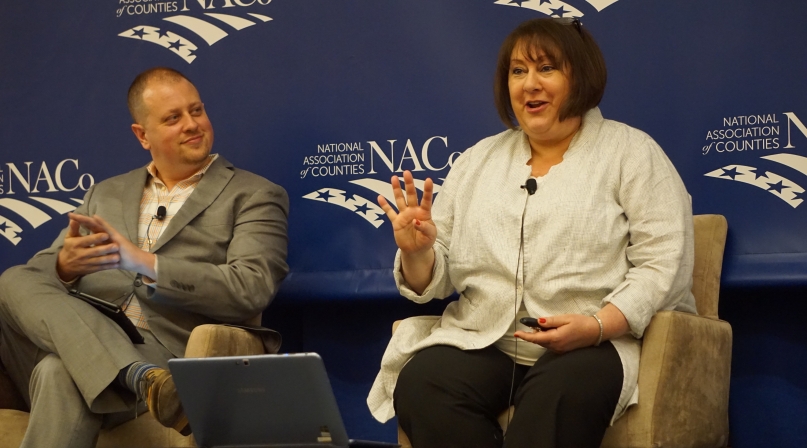Computers will 'learn' county functions
Upcoming Events
Related News

IBM's 'Watson' computer gets internship in Miami-Dade County
Cognitive computing and technology partnerships with academia are among the innovative approaches to governing explored at NACo’s latest Technology Summit.
The artificial intelligence (AI) of cognitive computing is a “paradigm shift,” said Jeff Rogers, who heads IBM’s government cognitive solutions team, which is “training” its Watson computer technology to be used in various government applications. Watson, you may recall, is the computer that won the Jeopardy! quiz show several years ago.
“Cognitive computing has the ability to learn,” he said. “Algorithms help it absorb a lot of information and create connections among the data as they get smarter. It can understand natural language.
“It breaks down barriers between the citizen and the machine or computer program based on the data it’s provided.”
That’s what Miami-Dade County, Fla. is hoping to do as it implements a Watson-based “engagement advisor” to answer residents’ expected questions about the water and sewer departments after a change in billing frequency, according to Carmen Suarez of the county IT department’s enterprise architecture services division.
“What we’ve done is we’ve ingested all the standard operating procedures for the water and sewer call center — they have scripts they already use — so we gave Watson all of that,” she said, “and now we’re ‘training’ the engagement advisor to be able to answer the questions that come from the general public when they call.” It’s scheduled to be implemented in September.
The engagement advisor is part of the county’s three-phase plan to make greater use of cognitive computing. Suarez said a future project will “teach” Watson about planning, building and zoning.
The county’s Department of Regulatory and Economic Resources is inputting information on south Florida building codes, municipal codes and building standards, including plan review comments from its back-office system.
Ultimately, the goal is to have Watson take a first pass at reviewing construction plans. “That’s going to require telling Watson what different specific images look like,” she added, such as what a window looks like and what a septic tank looks like on plans.”
Responding during a Q&A, Suarez said the intent is not to replace humans but to augment their capabilities. “These tools are intended as reference tools, as guiding tools, as ways that the construction-permitting population can make their plans more accurate, better — to reduce the time it takes to get permits and build the building.”
Another audience member asked about scalability: While large counties like Miami-Dade have the resources to expand into AI, what can smaller counties do?
Rogers said regardless of size, many jurisdictions have an “untapped resource” in local colleges and universities.
Although hours apart, that statement could have been a segue into luncheon keynote speaker Martin O’Malley’s remarks. The former mayor of Baltimore, governor of Maryland and recent Democratic presidential candidate discussed his role at MetroLab Network, where he is a senior fellow. MetroLab is a “city-university collaborative for urban innovation,” supported by Carnegie Mellon University and the MacArthur Foundation.
MetroLab “has set out to bridge that gap, to forge this largely untapped connection between the critically urgent work of local government and the talent and the innovation that exists in our universities and colleges across the country,” he said.
Among MetroLab Network’s areas of focus, he said, are traffic management (more intelligent and connected transportation solutions), predictive analytics, sustainability and urban sensor networks.
Regarding partnerships, O’Malley noted that the University of Notre Dame and South Bend, Ind. are preparing to activate a system of smart valve sensors in their combined storm water-sewage system that “flip back and forth in anticipation of the rainfall to make greater use of the capacity so they don’t have to dig a whole redundant system.”
“Mayors, county executives, commissioners — we like to be the best at doing something second, after having seen somebody else work out the R&D and the proof of concept,” he said.
“This new form of technology transfer must respond to the needs of citizens who demand now, as we all know, that their government be at least as efficient as Amazon is, or their banks … It’s the world we live in.”
Earlier in the day, attendees heard from Maury Blackman, president and CEO of Accela, which designs and markets cloud-based systems that increase civic engagement with local governments.
“The citizens are looking for everything to be dynamic and 24/7 and open and transparent, and they have no patience to wait,” he said.
The proliferation of mobile devices has contributed to those expectations, he added, particularly with citizens or businesses that interact with counties.
“The fact that what we can do today is basically put the county government in their pocket through mobile tech, through smartphones,” Blackman added. “I think that has the capability to kind of transform and supercharge this relationship between county governments and the local businesses.”
The summit, which was streamed live, also included a two-part Cyber Town Hall, whose panelists included industry experts, county IT professionals and a U.S. Department of Homeland Security representative, among others.
Panelists warned of evolving threats from ransomware, malware that can hold an organization’s data “hostage.” From Tim Hastings, director of state, local government and education services for Mandiant, came this sobering message: “There’s two types of organizations out there, in my opinion, those that have been breached and those that just don’t know they have been breached.”
Counties should be concerned about ransomware because “there’s so much of it and little of it is directed, but mostly it’s spray and pray,” said Kevin Haley, director of security response for Symantec.
“Information security in the government space has been lacking for quite some time,” according to Ricardo Lafosse, chief information security officer for Cook County, Ill. He was hired about three years ago to stand up the county’s defenses and said he encountered “lots of resistance.”
“It’s a huge cultural change from the typical government processes to have security bolted onto many of the typical HR, finance, health processes instead of baking them in.”
His team took a people-process-technology approach that began with hiring the right personnel — a challenge when counties have to compete with the private sector. What he does is hire more junior information security staff and develop their skills.
Dave Stern from the U.S. Department of Homeland Security’s state and local cybersecurity engagement program, touted the resources his agency makes available to local governments, such as ransomware fact sheets. He encouraged counties who are not involved with MS-ISAC to engage with the organization. “If you’re not a member… you’re still entitled to receive incident-response services,” he said. “There’s no reason not to be a member; it’s free.”
Attachments
Related News

Bureau of Land Management updates regulations for broadband infrastructure development on federal public lands
The BLM published a final rule to update regulations for developing and operating broadband infrastructure on public lands.

FCC takes critical steps to improve the 988 National Suicide Lifeline
On March 21, bipartisan congressional leaders and FCC Chairwoman Jessica Rosenworcel announced steps to improve the 988 National Suicide Lifeline. This announcement marks major progress on the nation’s crisis response, a priority for counties and a key policy pillar of the NACo Commission on Mental Health and Wellbeing.
